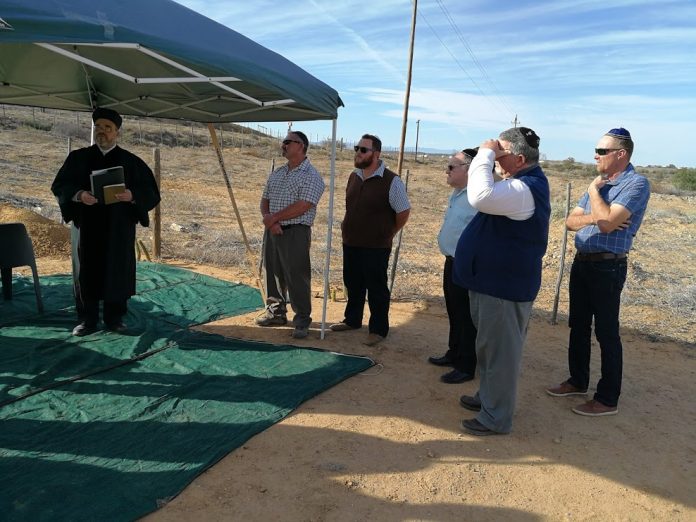By Rabbi Stuart Serwator
Jewish Law prescribes that one of the ways in which to show our national mourning on Tisha b’Av, the saddest day in the Jewish calendar, is not to greet each other until chatzot hayom, Halachic noon.
So while to receive a call mid-morning on that day was surprising, it was even more surprising that it was from Rabbi Moshe Silberhaft, South African Jewish Board of Deputies’ Country Communities Rabbi, who amazed me by asking me to go to Calitzdorp the next day to conduct a funeral for a Jewish man who had passed away there. Although Jews began settling in Calitzdorp in 1888, none had ever been buried there. Either they died there and were buried elsewhere — likely in Oudtshoorn, 50 km away — or they died and were buried elsewhere.
Mr Elliah Louis Herring had registered, demarcated, fenced and gated a cemetery on his farm and had divided it into two: one on which to bury Christian people, the other on which to bury Jewish people. Sadly, the first Jewish funeral on that cemetery was to be his own.
In Jewish Law registering a cemetery is not enough. It is then necessary to hold a service to consecrate such a cemetery, to make it holy land. This service takes place seldom and few Rabbis get to conduct one in their career. It was only the second time in over 40 years that a new Jewish cemetery had been consecrated in the Cape, the first being at Plettenberg Bay a few years ago. The Service comprises explaining why consecrating a Jewish cemetery is important and the laws regarding one, a few prayers and a formal public declaration of consecration of the area which must be clearly demarcated and separate from a cemetery of any other faith, but the main focus is on walking around the cemetery seven times while chanting Psalm 91.
The number seven denotes a cycle of completion, hence Shabbat is celebrated on the seventh day of the week, the (Shmittah) Sabbatical year in Israel being in the seventh year, when agricultural land is left to lie fallow, and Shavuot is celebrated on the day after completing seven full weeks of seven days each. In Western music, a scale comprises seven notes, with the 8th being the same as the tonic (the starting-note), either one octave above or below. This Psalm, whose number is 13×7, speaks of G-d as protector and carer, of immunity against attack and of our reward for trusting in Him. Its reassuring themes are the reason that it features in the Funeral and Consecration Services and at a Cemetery Consecration Service.
Elliah Herring’s parents emigrated from Lithuania and Latvia to South Africa, settling in Oudtshoorn and later buying a farm which they named ‘Warmbad’, which was later renamed by Elliah’s son, Mervyn, to ‘Moses Hope’ in honour of the memory of his late grandfather Moses Herring. Moses Herring and his wife, Rachel, wanted a good Jewish and general education for young Ellie, they sent him all the way to Cape Town to the Herzlia hostel at the young age of 12 in 1947. He celebrated his Barmitzvah at the Great Synagogue then went to high school at SACS, intending to matriculate and to study medicine. However, when his father died when Ellie was 16, as he was the eldest son of four children, his mother told him to return to the farm and to start running it, which he did.
Despite a couple of intervals, when conditions were too tough to farm, he continued his father’s work for the next 66 years until returning his soul to G-d on 22 July this year. After the Cemetery Consecration Service, attended by the Jewish people present, about 70 people attended the funeral, accompanying the coffin on foot from the farm-house the short distance to the cemetery. Eulogies were delivered by Rabbi Stuart Serwator, Mr Fishel Kaufman and Mr Brian Minnie. At 4.30 pm, at the end of the funeral, as the Karoo sky turned from cloud-streaked blue to the grey of dusk, and after family, friends and farm-workers had filled the last of the earth into the deep grave, three unusual things happened.
Firstly, an elderly lady sat down on a chair, a guitar on her lap. Behind her stood three younger ladies, one of whom introduced the seated lady as her mother, who, she said, had worked for Mr Herring’s parents. She then thanked them and the late Mr Herring for being such kind and caring employers. Then the seated lady, accompanying herself on the guitar, sang a song in Afrikaans acknowledging her faith in G-d. Appropriately, this paralleled the first part of the Funeral Service, which acknowledges G-d as the True Judge. Next, the three ladies behind her sang in English a capella in beautiful harmony a song of praise to G-d. As those present slowly traipsed in silence to the fence of the cemetery, where the family had considerately arranged urns of water, basins, big old enamel jugs and towels for the ceremonial washing of the hands, there was not a dry eye.











